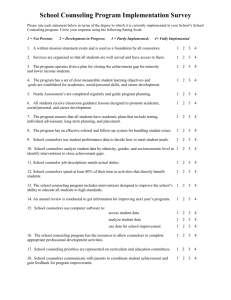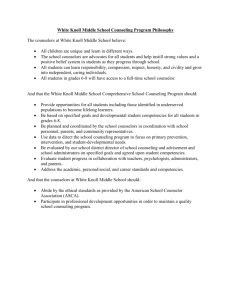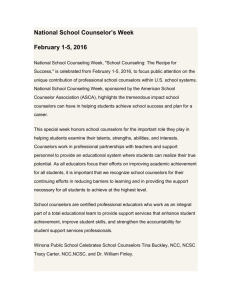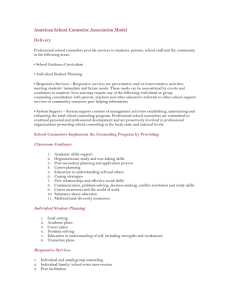Today`s School Counselor - North Carolina School Counselor
advertisement
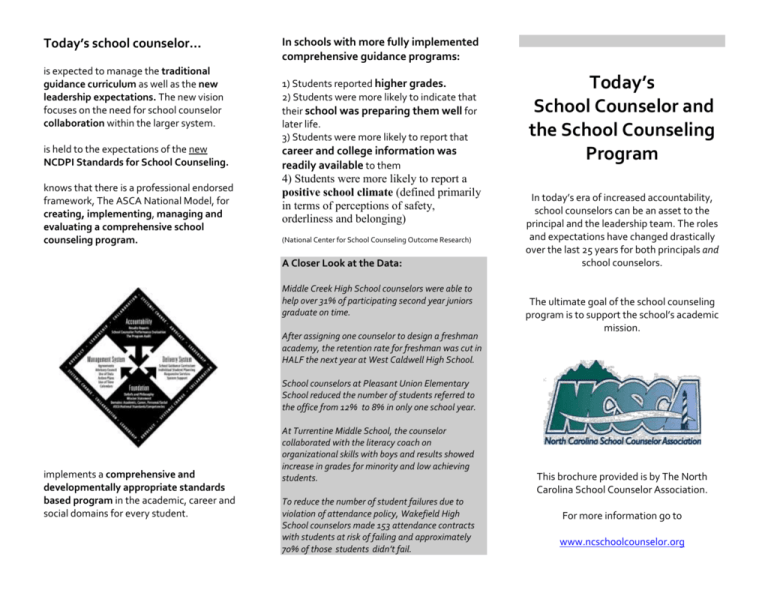
Today’s school counselor… is expected to manage the traditional guidance curriculum as well as the new leadership expectations. The new vision focuses on the need for school counselor collaboration within the larger system. is held to the expectations of the new NCDPI Standards for School Counseling. knows that there is a professional endorsed framework, The ASCA National Model, for creating, implementing, managing and evaluating a comprehensive school counseling program. In schools with more fully implemented comprehensive guidance programs: 1) Students reported higher grades. 2) Students were more likely to indicate that their school was preparing them well for later life. 3) Students were more likely to report that career and college information was readily available to them 4) Students were more likely to report a positive school climate (defined primarily in terms of perceptions of safety, orderliness and belonging) (National Center for School Counseling Outcome Research) A Closer Look at the Data: Middle Creek High School counselors were able to help over 31% of participating second year juniors graduate on time. After assigning one counselor to design a freshman academy, the retention rate for freshman was cut in HALF the next year at West Caldwell High School. Today’s School Counselor and the School Counseling Program In today’s era of increased accountability, school counselors can be an asset to the principal and the leadership team. The roles and expectations have changed drastically over the last 25 years for both principals and school counselors. The ultimate goal of the school counseling program is to support the school’s academic mission. School counselors at Pleasant Union Elementary School reduced the number of students referred to the office from 12% to 8% in only one school year. implements a comprehensive and developmentally appropriate standards based program in the academic, career and social domains for every student. At Turrentine Middle School, the counselor collaborated with the literacy coach on organizational skills with boys and results showed increase in grades for minority and low achieving students. To reduce the number of student failures due to violation of attendance policy, Wakefield High School counselors made 153 attendance contracts with students at risk of failing and approximately 70% of those students didn’t fail. This brochure provided is by The North Carolina School Counselor Association. For more information go to www.ncschoolcounselor.org Today’s school counselor… is skilled and proficient in a variety of prevention and intervention programs and recognizes that a system approach may be necessary to address the data driven needs. provides appropriate responsive services through use of individual and group counseling, referrals, and consultation with support staff, teachers, and families. is a vital member of the education team ensuring equitable and rigorous educational opportunities for every student ensuring that students recognize the value of a challenging coursework. is accountable by measuring their results and sharing the data with principals and staff to contribute to the school improvement plan. recognizes that individual student planning is important in drop out prevention and college readiness. reviews and disaggregates data to identify achievement gaps and determine interventions. understands both social/emotional and educational issues to provide services that are integrated to remove barriers to student learning. “A Counseling System Under Stress” A recently released study by Public Agenda from the Bill and Melinda Gates Foundation illustrates what can go wrong when there are not enough school counselors to support students and when school counselors are placed in positions preventing them from performing the functions they were trained and hired to do. In addition, as the study notes, school counselors are increasingly called on to do work outside of their mission, including: "discipline issues and sorting out scheduling and other administrative mix-ups with the high school." More school counselors are needed, and existing school counselors should not be overloaded with non-counseling duties preventing them from spending time successfully guiding students to academic success and postsecondary education. “Can I Get a Little Advice Here?” Public Agenda can be found at www.publicagenda.org/theirwholelivesaheadofthem?qt_active =1 We Speak the Same Language ISSLLC Educational Leadership standards and School Counseling standards are synonymous: collaboration, leadership, data driven decisions, advocacy, equity, accountability, evaluation, managing resources, vision, mission, improvement, management Appropriate Counseling Responsibilities: Designing individual student academic programs Counseling students with excessive absenteeism Counseling students with discipline issues Collaborating with teachers to present guidance curriculum lessons Analyzing data in relation to student achievement Consulting with teachers about student behavior and academics Consulting with administration on the master schedule Providing staff in-service on behavioral or academic issues Inappropriate (Non-counseling) Activities: Registering/scheduling new students Test coordination Signing attendance slips Performing disciplinary actions Substitute teaching Computing GPAs Clerical record keeping/mass NCWISE data input Master schedule Working with one student at a time in a therapeutic, clinical mode The recommended ratio of students to school counselor is 250:1.


